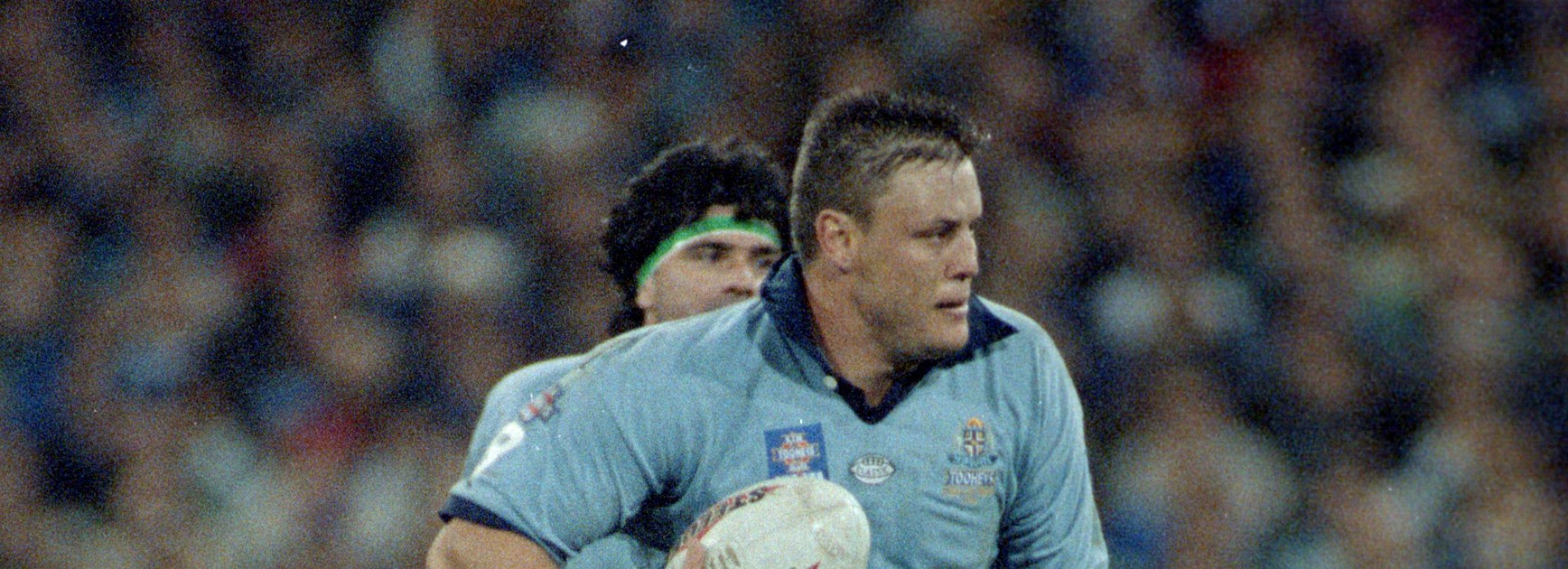By Roy Masters
Melbourne has been a happy hunting ground for the Blues over the 35 years that State of Origin matches have been played in the Victorian capital. This year’s 26 June match, the second in the series, will be Melbourne’s tenth Origin match, with NSW holding a 5-4 record.
The record is even more dominating at the MCG, with the Blues 4-1 ahead. The 2015 win at the MCG, before a record Origin crowd of 91,000, is significant. The Blues’ base was a hotel on St Kilda Road but the traffic was so heavy the team reached the dressing room just in time to pull on their gear and warm up. As Ryan Hoffman, a NSW forward, remembers it: “We didn’t have sight of the vast crowd until we ran out. Defence won us the game 26-18. We just kept tackling and turning up for each other in attack and defence.”
The result, in retrospect, is a learning experience for the multiple lost opportunities which haunt Origin players. Long after many have retired, the “what ifs” keep them awake at night. I recall NSW coach Graham Murray lamenting, just a short time before he died at the age of 58 in 2013, the two moments that cost him wins in series that were played only a few years earlier. Both involved intercepts by Queensland captain Darren Lockyer. The first was at Melbourne’s Docklands Stadium in 2006 when the Maroons scored two converted tries in the last five minutes, the final try coming when Lockyer snapped up a wild Brett Hodgson pass from dummy-half.
Hoffman’s 2015 experience is instructive in realising how one year’s Origin impacts on the next. The first game of 2015 was played at Stadium Australia, Sydney, with Queensland winning 11-10.
“We kept going for a try at the end of the match in Sydney, instead of kicking a field goal.” Hoffman says.
“NSW had won the series the previous year, breaking Queensland’s eight year winning streak under Mal Meninga. If we had drawn the 2015 Sydney match, the win in Melbourne would have meant we won the series by being holders of the trophy.
“Considering that we were playing perhaps the greatest rugby league team of all time, we could have had two series wins against them in their historical streak. It’s a lost opportunity which I think about still.”
If Origin is all about moments, the 2015 win at the MCG turned on one. Queensland’s Greg Inglis scored a spectacular try which was disallowed. The Maroons briefly dropped their heads and the Blues pounced for their 26-18 win.
Another Origin lesson came from the very first match played at the MCG, the citadel of sport in the southern capital. The Blues’ 14-nil victory in 1994 demonstrated that winning is more important than entertaining. Grind beats glamour. Queensland had won the first game in Sydney with a last-minute, spectacular try to winger Mark Coyne. NSW coach Phil Gould, therefore, needed to win in Melbourne. However, to open up the series he had to close down the game. The Blues played a safety-first style, minimising errors and maximising completions. NSW hooker Ben Elias teased the Maroons around the ruck, infuriating them by setting up a try. If the NSW fans hated Wally Lewis, the Queenslanders loathed Benny. But the game was a snore-fest for the non-partisan crowd, with the then record 85,513 chanting “boring” whenever the referee stopped the game to lecture players. But when it comes to Origin, boring wins are better than exciting losses, aren’t they?
Still, the members section of the MCG, reserved for the establishment types who think a set of six is a table setting at a silvertail dinner party, attended in big numbers. Furthermore, it was justification for the five years of persistence by NSWRL chief executive John Quayle to play an elite game at the hallowed ground of the sporting capital of Australia. Players often don’t appreciate the efforts made by administrators to showcase the game. The general manager of the MCG, Dr John Lill, refused to even take Quayle’s calls to meet with him. So Quayle caught a plane to Melbourne and met with the Victorian Premier, Jeff Kennett. Quayle guaranteed Kennett a 50,000 crowd at the MCG and claimed half would be interstate visitors. Kennett called Dr Lill and said words to the effect of “I’ve got a rugby fella here and he reckons he can get 25,000 people from NSW and Queensland to the MCG. We love interstate money. Give him the ground.”
While the dour 1994 MCG match was hardly a “move over Cazaly” moment for rugby league, the Melbourne crowd got what they wanted the following year: an old-fashioned stink. The Super League war broke out in 1995 and, with many of the best players from Queensland having signed with the News Limited owned Super League, they were ineligible to play in a competition run by the ARL. It suits the Queensland psyche to be the underdog, especially when they hadn’t won an Origin series since 1991. The all-in brawl, which came after three minutes, also suited them. It appeared scripted in that it followed the first scrum. Manly team mates John Hopoate (NSW) and Danny Moore (Queensland) traded blows, continuing the mate-against-mate theme of 1980. Referee Eddie Ward halted play for five minutes to regain control, with Queensland winning 20-12 and clinching the series. Significantly, it is the only game the Maroons have won at the MCG.
NSW gained revenge only two years later when another brawl broke out following a cattle dog call from coach Tom Raudonikis, his signal to ignite an all-in. Queensland’s Jamie Goddard felled future Immortal Andrew Johns with a flurry of perfectly timed blows but the Blues won the football, prevailing 15-14.
The first Origin game in Melbourne was played in 1990 at Olympic Park, now a training ground for Collingwood adjacent AAMI stadium, home of the Storm. It was the debut of an 18-year-old Brad Fittler. Sitting on the hill watching the game was a young Laurie Daley, later to become, like Fittler, a NSW captain and coach. Meninga, Daley’s teammate at the Raiders, was playing for Queensland. A spectator was abusive to Meninga. According to Daley, “he was giving Mal a hard time. He was using racist language and I stood up for Mal. There was a bit of a push and shove. I was sticking up for a teammate.”
Years later, however, when Laurie and Mal opposed each other as Origin captains, there was no such bond.
“For my first game ever as captain, Mal was very late coming out for the coin toss. He made me wait. I stood out there for ages.” Laurie says.
“So when it came to Mal’s last game, Gus (NSW coach Phil Gould) told me to disappear and hide from the touch judges. I made him wait.”
Daley used his time in the Lang Park dressing room well, saying of his Canberra teammate, “Mal’s had everything. He’s had kangaroo tours, he’s captained Australia. This isn’t his benefit night. This is our game.”
NSW won 27-12.








